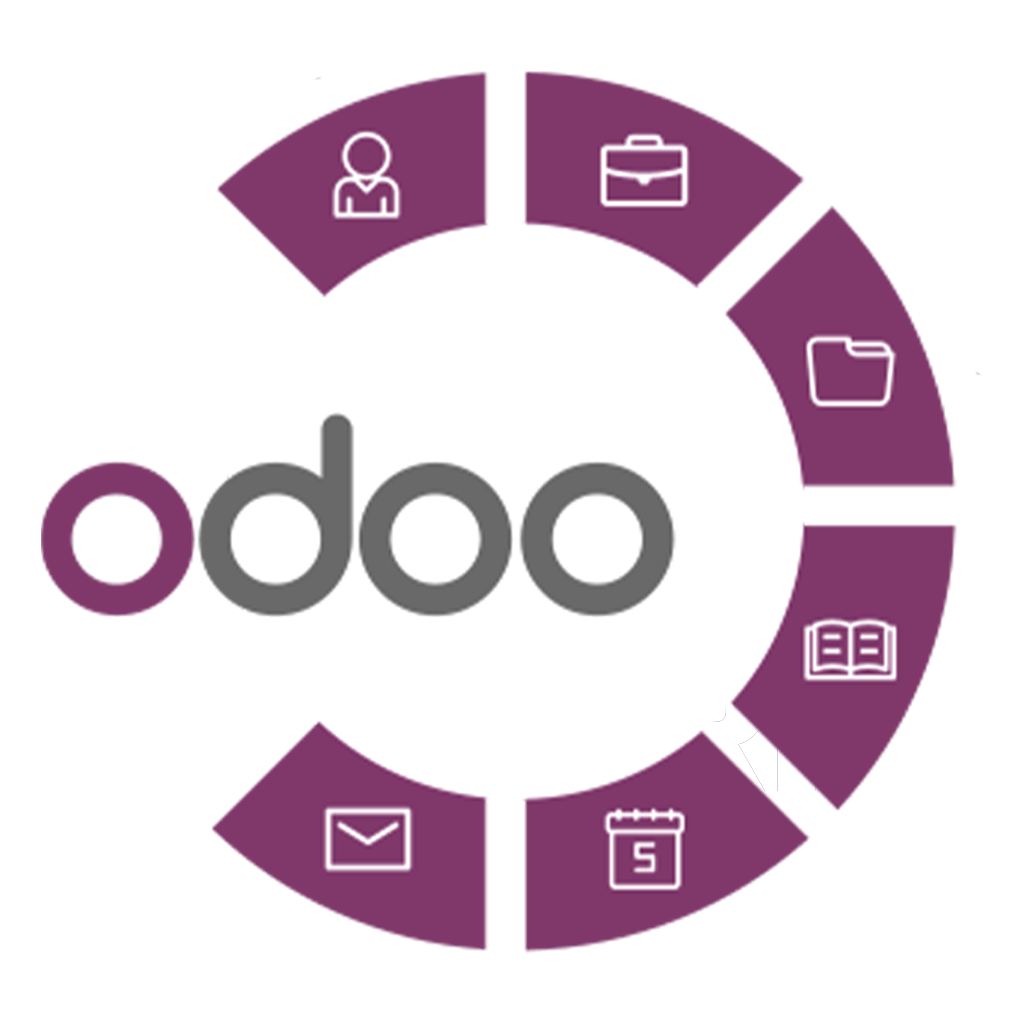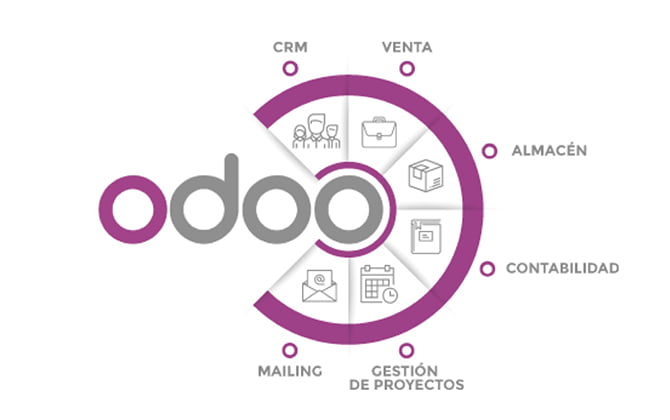Introduction to Odoo
Overview of Odoo ERP

In today’s dynamic business landscape, organizations require robust tools to manage various functions efficiently. Odoo emerges as a powerful solution, offering a comprehensive and user-friendly Enterprise Resource Planning (ERP) system.
An ERP system integrates core business functions like accounting, inventory management, customer relationship management (CRM), and human resources (HR) into a single platform. This centralized approach streamlines data flow, eliminates information silos, and fosters improved operational efficiency.
Odoo stands out for its unique approach to ERP:
- Integrated Business Apps: Odoo breaks down traditional ERP modules into a collection of individual, yet seamlessly integrated, business applications. Each app focuses on a specific function, allowing for a modular and scalable solution.
- Open-Source Foundation: Odoo offers a Community version with a free and open-source license. This makes it an attractive option for businesses seeking a cost-effective ERP solution with access to the source code for customization.
- User-Friendly Interface: Odoo boasts a modern and intuitive user interface, making it easy for users with varying technical skillsets to navigate and utilize the system effectively.
Brief History and Evolution The story of Odoo began in 2005 under the name
TinyERP, developed by Belgian entrepreneur Fabien Pinckaers. Initially focused on CRM functionality, it gradually expanded to encompass other core ERP modules. In 2009, the name was changed to OpenERP, reflecting its open-source nature.
A pivotal moment arrived in 2014 with the release of Odoo version 8. This marked a significant shift towards a more modular and web-based architecture, laying the foundation for the current iteration of the platform.
Here’s a glimpse into Odoo’s evolution:
- TinyERP (2005): Focused primarily on CRM functionalities.
- OpenERP (2009): Expanded to include additional ERP modules while retaining its open-source foundation.
- Odoo 8 (2014): Introduced a modular app structure, web-based architecture, and a more user-friendly interface.
- Odoo Today: Continues to evolve with regular updates, offering a comprehensive suite of business apps catering to a wide range of industry needs.
The open-source nature of Odoo fosters a vibrant community of developers who contribute to the platform’s ongoing development. This collaborative approach ensures continuous improvement, feature updates, and a growing library of third-party modules that extend Odoo’s functionality.
Here’s a breakdown of the key benefits Odoo offers:
- Cost-Effectiveness: The availability of a free Community version makes Odoo an attractive option for businesses with budget constraints.
- Scalability and Customization: The modular app structure allows businesses to implement only the functionalities they need and scale up as their requirements evolve. Additionally, the open-source nature allows for customization to fit specific business needs.
- User-Friendliness: The intuitive interface makes Odoo easy to learn and use, even for users with limited technical expertise.
- Integration Capabilities: Odoo offers seamless integration with various third-party applications and services, further extending its functionality.
- Active Community: The large and active Odoo community provides valuable support, resources, and ongoing development contributions.
In conclusion, Odoo presents a compelling solution for businesses seeking a comprehensive, user-friendly, and cost-effective ERP system. Its modular app structure, open-source foundation, and active community development make it a powerful tool for organizations aiming to streamline operations, improve efficiency, and gain a competitive edge.
Key Features of Odoo

Odoo’s unique strengths lie in its modular design, comprehensive application suite, and user-friendly interface. Let’s delve deeper into these key features:
Modular Structure and Customization
Odoo breaks away from the traditional monolithic ERP structure. Instead, it offers a collection of individual business applications, each specializing in a specific functionality. These apps seamlessly integrate with each other, providing a unified user experience while maintaining modularity.
Here’s how this modular approach benefits businesses:
- Scalability and Flexibility: Businesses can implement only the apps they need, starting small and scaling up as their requirements evolve. This allows for a cost-effective approach that avoids paying for unnecessary functionalities.
- Reduced Complexity: By focusing on specific functions, each app is easier to learn and use compared to a complex, all-encompassing ERP system.
- Customization Potential: The open-source nature of Odoo allows for customization of individual apps or development of entirely new apps to cater to specific business needs. This level of customization empowers businesses to tailor the system to their unique workflows and processes.
Odoo offers a rich ecosystem of business apps, encompassing a wide range of functionalities:
- Sales & CRM: Manage customer relationships, sales pipelines, opportunities, and quotations.
- Inventory Management: Track stock levels, automate purchase orders, and optimize warehouse operations.
- Accounting & Finance: Manage invoices, payments, general ledger, and financial reporting.
- Project Management: Plan, track, and collaborate on projects, tasks, and deadlines.
- Manufacturing: Manage production processes, bills of materials, and work orders.
- Human Resources: Streamline HR processes like recruitment, onboarding, payroll, and performance management.
- Website Builder: Create and manage a website integrated with other Odoo applications.
- Marketing Automation: Automate marketing campaigns, email marketing, and lead generation.
- Many More: Odoo offers a vast library of additional apps catering to specific industries and needs.
This extensive app library empowers businesses to create a customized ERP solution that perfectly aligns with their operational requirements.
Integrated Applications Suite
One of the core strengths of Odoo is its seamless integration between all the business applications. Data flows freely between apps, eliminating the need for manual data entry and ensuring consistency across the entire system. Here’s how this integration benefits businesses:
- Improved Data Accuracy: Elimination of manual data entry minimizes errors and ensures data consistency throughout the system.
- Streamlined Workflows: Integrated functionalities allow users to work seamlessly between different departments, fostering collaboration and efficiency.
- Enhanced Visibility: A unified platform provides a holistic view of business operations, enabling data-driven decision-making.
For instance, consider a sales team using the CRM app to create a sales order. This order can automatically trigger the creation of a corresponding inventory picklist in the inventory management app, ensuring proper stock allocation. Similarly, the sales order information can seamlessly flow into the accounting app for invoice generation.
User-Friendly Interface
Odoo boasts a modern and intuitive user interface that prioritizes ease of use. Here’s how the user interface contributes to a positive user experience:
- Clean and Uncluttered Design: The interface is free from clutter, with clear menus and intuitive navigation. This makes it easy for users to find the information and functionalities they need.
- Role-Based Dashboards: Users are presented with personalized dashboards that display relevant information based on their role and permissions. This reduces information overload and keeps users focused on their tasks.
- Drag-and-Drop Functionality: Odoo utilizes drag-and-drop features in certain functionalities, allowing users to easily customize their workspace and organize information as needed.
- Mobile-Responsive Design: The Odoo interface is optimized for mobile devices, allowing users to access the system and perform essential tasks on the go.
- Multiple Language Support: Odoo caters to a global audience by offering support for multiple languages, making it accessible to a broader user base.
By prioritizing user-friendliness, Odoo empowers users of all technical skill sets to leverage the system effectively, improving overall adoption and maximizing the value of the ERP investment.
In conclusion, Odoo’s modular structure, integrated applications suite, and user-friendly interface make it a compelling choice for businesses seeking a versatile and user-centric ERP solution. These features allow for a high degree of customization, streamlined workflows, and a positive user experience, ultimately contributing to improved operational efficiency and business growth.
Odoo Modules and Applications

Odoo’s modular approach to ERP functionality is centered around individual business applications. These applications seamlessly integrate with each other, allowing businesses to create a customized solution that caters to their specific needs. Here’s a closer look at some of the core Odoo modules and applications:
CRM and Sales Management
The CRM and Sales Management applications within Odoo empower businesses to manage the entire sales lifecycle, from lead generation to customer retention. Here’s a breakdown of key functionalities:
- Lead Tracking and Management: Identify, qualify, and nurture potential customers through the sales funnel. Track lead interactions, record activities, and assign leads to sales representatives.
- Opportunity Management: Create and manage sales opportunities, track progress through different stages, and generate quotations.
- Sales Pipeline Management: Visualize the sales pipeline to monitor the progress of deals, identify bottlenecks, and forecast sales performance.
- Quotation and Order Management: Create professional quotations, convert them to sales orders, and manage the order fulfillment process.
- Customer Relationship Management: Store customer information, track communication history, and manage customer accounts.
Benefits:
- Improved lead conversion rates
- Streamlined sales processes
- Enhanced customer relationships
- Increased sales pipeline visibility
- Data-driven sales forecasting
Inventory and Warehouse Management
The Inventory and Warehouse Management applications in Odoo provide comprehensive tools to manage stock levels, optimize warehouse operations, and ensure efficient fulfillment. Here are some key functionalities:
- Product Management: Create and manage product catalogs, define product attributes, variants, and stock keeping units (SKUs).
- Inventory Control: Track stock levels in real-time, set minimum and maximum stock levels, and generate automated purchase orders to maintain optimal inventory levels.
- Warehouse Management: Manage multi-location warehouses, organize stock locations, and optimize picking and packing processes.
- Serialized Inventory Management: Track individual items within your inventory using serial numbers or lot numbers for enhanced control.
- Barcode Scanning: Utilize barcode scanners to automate data entry tasks, improve accuracy, and streamline warehouse operations.
- Shipping Management: Integrate with shipping carriers, manage shipping costs, and print shipping labels directly from Odoo.
Benefits:
- Reduced stockouts and overstocking
- Improved inventory accuracy
- Optimized warehouse operations
- Increased order fulfillment efficiency
- Enhanced supply chain visibility
Accounting and Financial Management
The Accounting and Financial Management applications within Odoo offer a comprehensive suite of functionalities to manage finances, generate reports, and ensure financial compliance. Here are some key features:
- Invoicing: Create and manage invoices, process customer payments, and track outstanding receivables.
- Accounts Payable: Manage supplier invoices, automate bill payments, and streamline accounts payable processes.
- General Ledger: Record financial transactions, categorize income and expenses, and maintain a clear general ledger.
- Tax Management: Configure tax rules, automate tax calculations on invoices and purchases, and generate tax reports.
- Financial Reporting: Generate a variety of financial reports, including balance sheets, income statements, and cash flow statements.
- Budgeting and Forecasting: Create budgets, track financial performance against budget targets, and make data-driven financial forecasts.
Benefits:
- Streamlined invoicing and billing processes
- Improved cash flow management
- Enhanced financial transparency and reporting
- Simplified tax compliance
- Data-driven financial decision-making
These are just a few of the core Odoo modules and applications available. Odoo offers a vast library of additional modules catering to specific industries and functionalities, such as:
- Project Management: Manage projects, tasks, resources, and deadlines.
- Manufacturing: Streamline production processes, manage bills of materials, and track work orders.
- Human Resources: Handle HR processes like recruitment, onboarding, payroll, and performance management.
- Website Builder: Create and manage a website integrated with other Odoo applications.
- Marketing Automation: Automate marketing campaigns, email marketing, and lead generation.
By leveraging a combination of these modules, businesses can create a customized ERP solution that perfectly aligns with their specific needs and operations. This modular approach ensures that businesses only pay for the functionalities they require, promoting cost-effectiveness and scalability.
Implementing Odoo for Your Business
Successfully implementing Odoo for your business requires careful planning and consideration of several factors. Here’s a breakdown of key aspects to address:
Odoo Deployment Options
Odoo offers various deployment options to suit different business needs and IT infrastructure preferences:
- Odoo Online (Cloud-Based): This is a subscription-based service where Odoo manages the entire infrastructure. It’s ideal for businesses seeking a quick and easy setup with minimal IT expertise required. However, customization options are limited in the online version.
- Odoo.sh (Cloud Hosting): Odoo.sh provides a more customizable cloud-based solution. It offers greater control over the system compared to Odoo Online and allows for integration with third-party applications.
- On-Premise Deployment: This option involves installing Odoo on your own servers. It offers the highest level of customization and control but requires significant IT expertise for installation, maintenance, and security management.
Choosing the right deployment option depends on factors like:
- IT expertise: Cloud-based options are ideal for businesses with limited IT resources.
- Customization needs: On-premise deployment offers the most flexibility for customization.
- Budget: Cloud-based options typically have a predictable monthly subscription cost, while on-premise deployments require upfront investment in hardware and IT resources.
Customization and Configuration
Odoo offers a good balance between pre-built functionalities and customization capabilities. Here’s how to tailor the system to your specific needs:
- Configuration: The Odoo interface allows for extensive configuration of existing functionalities. You can define workflows, customize fields, and automate specific tasks.
- App Selection and Integration: Choose the relevant Odoo apps to match your business requirements and integrate them seamlessly for a unified workflow.
- Custom Development: For highly specific needs beyond Odoo’s native functionalities, consider Odoo’s development tools or engage an Odoo development partner to create custom modules.
Odoo Community vs. Enterprise Edition
Odoo offers two main versions:
- Odoo Community: This is a free and open-source version. It provides a solid foundation of functionalities suitable for many businesses. However, it comes with limited support and may lack some advanced features like multi-company management or advanced reporting.
- Odoo Enterprise: This is a paid subscription version offering a wider range of functionalities, including multi-company management, advanced reporting tools, and priority support.
Choosing the right edition depends on your business needs:
- For small businesses or those with limited budgets, the Community version can be a good starting point.
- As your business grows or requires more advanced features and support, consider upgrading to the Enterprise edition.
By carefully considering these factors, you can ensure a smooth Odoo implementation that aligns with your business goals and maximizes the value of your ERP investment.
Benefits of Using Odoo ERP
Odoo stands out as a compelling ERP solution for businesses seeking a combination of functionality, affordability, and ease of use. Here are some key benefits that make Odoo a valuable asset:
Cost-Effectiveness and Affordability
- Free Community Edition: The availability of a free and open-source Community version makes Odoo an attractive option for businesses with budget constraints. This version offers a robust foundation of functionalities, allowing businesses to get started with ERP without a significant upfront investment.
- Subscription-Based Pricing: The Enterprise edition of Odoo follows a subscription-based pricing model. This predictable monthly cost allows for easier budgeting compared to traditional ERP solutions with hefty licensing fees.
- Reduced Customization Costs: Odoo’s modular design and extensive app library minimize the need for extensive custom development, reducing overall implementation costs.
Scalability and Flexibility
Modular Design: The modular app structure allows businesses to implement only the functionalities they need, starting small and scaling up as their requirements evolve. This eliminates the need to pay for unnecessary features and ensures a cost-effective approach.
- Easy Customization: The open-source nature of Odoo allows for customization of existing apps or development of entirely new apps to cater to specific business needs. This level of flexibility ensures the system can adapt and grow alongside your business.
- Future-Proof Technology: Regular updates and ongoing development by the Odoo community ensure the platform stays current with evolving technology and business trends.
Community Support and Updates
- Active Community: Odoo boasts a large and active community of users and developers. This community provides valuable support resources, tutorials, and assistance with troubleshooting issues.
- Regular Updates: The Odoo development team continuously releases updates, introducing new features, bug fixes, and security enhancements. This ensures the system remains secure and offers access to the latest functionalities.
- Collaborative Development: The open-source model fosters collaboration within the community, leading to ongoing improvement and innovation within the Odoo platform.
By leveraging these advantages, Odoo empowers businesses to streamline operations, improve efficiency, and gain a competitive edge, all while remaining cost-conscious and adaptable to future growth.
Odoo and Business Growth Strategies
Odoo goes beyond simply managing core business functions; it can be a powerful tool to fuel business growth strategies. Here’s how Odoo can contribute to achieving your growth objectives:
Streamlining Processes for Efficiency
- Automated Workflows: Automate repetitive tasks and define clear workflows within Odoo applications. This reduces manual effort, minimizes errors, and frees up employee time for more strategic activities.
- Improved Inventory Management: Optimize inventory levels with real-time stock tracking and automated purchase orders. This helps avoid stockouts, ensures smooth production processes, and reduces storage costs.
- Enhanced Sales Pipelines: Visualize and manage sales pipelines within the CRM module. This allows for better forecasting, identification of bottlenecks, and improved conversion rates.
By streamlining processes across various departments, Odoo helps businesses operate more efficiently, leading to cost savings and increased productivity.
Enhancing Collaboration and Communication
- Centralized Platform: Odoo provides a single platform for all business data and applications. This fosters transparency and eliminates information silos, allowing teams to collaborate seamlessly.
- Real-Time Communication: Odoo facilitates real-time communication through integrated chat functionalities. This improves team responsiveness and collaboration, leading to faster problem-solving and improved decision-making.
- Role-Based Dashboards: Personalized dashboards provide each user with the most relevant information. This improves focus and empowers employees to make informed decisions within their area of expertise.
Effective collaboration and communication are crucial for business growth. Odoo creates an environment that fosters these elements, leading to a more cohesive and productive workforce.
Data-Driven Decision-Making
- Comprehensive Reporting: Odoo offers a rich set of reporting tools that generate insightful reports across various business functions. This allows for data-driven decision-making based on real-time and historical data.
- Performance Monitoring: Track key performance indicators (KPIs) across departments to identify areas for improvement and measure the effectiveness of implemented strategies.
- Sales and Inventory Analytics: Gain insights into sales trends, customer behavior, and inventory levels. This allows for data-driven marketing campaigns, optimized inventory management, and improved resource allocation.
Odoo empowers businesses to leverage valuable data to make informed business decisions. This data-driven approach can significantly improve marketing efforts, resource allocation, and overall business performance, propelling your growth strategies forward.
By implementing Odoo and utilizing its functionalities strategically, businesses can streamline workflows, foster collaboration, and leverage data for better decision-making – all essential ingredients for achieving sustainable business growth.
Case Studies and Success Stories
Odoo’s versatility extends across various industries, empowering businesses to achieve real-world transformations. Here’s how:
Real-World Examples of Odoo Implementation
- Manufacturing: A mid-sized manufacturing company used Odoo to streamline production processes, improve inventory control, and gain real-time visibility into their supply chain. This resulted in reduced lead times, improved product quality, and increased customer satisfaction.
- E-commerce: An online retailer implemented Odoo to manage their entire sales process, from online store creation to order fulfillment and customer relationship management. This led to a significant increase in sales, improved customer service, and streamlined order processing.
Industries Benefiting from Odoo
These are just a few examples. Odoo caters to a wide range of industries, including:
- Manufacturing: Streamline production processes, manage inventory, and optimize supply chains.
- E-commerce: Manage online stores, automate sales processes, and provide excellent customer service.
- Professional Services: Manage projects, track billable hours, and improve client communication.
- Non-profit Organizations: Manage donations, track volunteer activities, and gain insights for fundraising efforts.
By delving into industry-specific case studies and success stories, you can gain valuable insights into how Odoo has helped businesses within your sector achieve remarkable results.
Future Trends in Odoo Development
The Odoo development team is constantly innovating to stay ahead of the curve. Here’s a glimpse into potential future trends for Odoo:
Emerging Technologies and Integrations
Artificial Intelligence (AI) and Machine Learning (ML): Integrating AI and ML functionalities can enhance data analysis, automate tasks, and provide predictive insights to support informed decision-making.
- Internet of Things (IoT): Odoo’s integration with IoT devices could allow for real-time data collection from equipment and sensors, optimizing production processes and maintenance schedules.
- Blockchain Technology: Blockchain integration could enhance data security and transparency within the supply chain, fostering trust and collaboration between businesses.
Odoo’s Roadmap and Upcoming Features
While specific details may evolve, Odoo’s development roadmap often focuses on:
- Enhanced User Experience (UX): Continuous refinement of the user interface to ensure a more intuitive and user-friendly experience.
- Advanced Analytics and Reporting: Development of more robust reporting tools and functionalities to provide deeper insights into business performance.
- Industry-Specific Features: Introduction of new features tailored to the specific needs of various industries.
By staying informed about Odoo’s development roadmap and future trends, businesses can make strategic decisions about their ERP system and ensure they are well-positioned to leverage the latest advancements for continued growth and success.
Conclusion: Empowering Businesses with Odoo ERP
In today’s dynamic business landscape, having a robust and adaptable ERP system is no longer a luxury, but a necessity. Odoo emerges as a compelling solution, offering a unique blend of functionality, affordability, and ease of use.
Odoo’s modular design empowers businesses to implement only the functionalities they need, while the open-source nature allows for customization to cater to specific requirements. The user-friendly interface ensures user adoption and promotes efficient workflows across departments.
Beyond core ERP functionalities, Odoo fosters collaboration, streamlines processes, and empowers data-driven decision-making. This translates into improved operational efficiency, increased productivity, and a solid foundation for achieving business growth objectives.
As technology continues to evolve, Odoo’s commitment to innovation ensures the platform remains at the forefront of ERP solutions. With its focus on emerging technologies, user experience improvements, and industry-specific features, Odoo empowers businesses to stay ahead of the curve and thrive in the competitive business world.
By leveraging the capabilities of Odoo ERP, businesses can gain a significant edge, achieve operational excellence, and unlock their full growth potential.
Odoo ERP is a comprehensive suite of integrated business applications designed to streamline and manage various aspects of a company’s operations. What sets Odoo apart is its modular structure, allowing businesses to choose and implement specific applications relevant to their needs. Unlike traditional ERP systems, Odoo’s flexibility and scalability make it adaptable to diverse industries and business sizes.
Odoo is committed to open source principles, fostering a collaborative and community-driven approach to development. This means that the source code is accessible to the public, encouraging community contributions and innovation. The open source nature of Odoo not only promotes transparency but also allows businesses to customize and tailor the ERP system to their unique requirements, leading to a more flexible and cost-effective solution.
Yes, one of the key strengths of Odoo ERP lies in its adaptability. Businesses can customize Odoo to fit their specific needs by selecting and integrating modules relevant to their operations. Whether it’s managing customer relationships, handling inventory, or overseeing accounting processes, Odoo provides a modular framework that allows businesses to build a personalized ERP system tailored to their industry and workflow.
Odoo is renowned for its user-friendly interface, making it accessible to businesses with varying levels of technical expertise. The platform is designed to be intuitive, allowing users to navigate and utilize its features with ease. Additionally, Odoo offers extensive documentation, tutorials, and a supportive community, ensuring that businesses can harness the full potential of the ERP system regardless of their technical background.
Odoo ERP caters to a wide range of industries due to its modular and customizable nature. Industries such as manufacturing, retail, e-commerce, healthcare, and services can benefit significantly from Odoo’s integrated applications. The adaptability of Odoo allows businesses in diverse sectors to optimize their processes, enhance efficiency, and gain a competitive edge in their respective markets.


